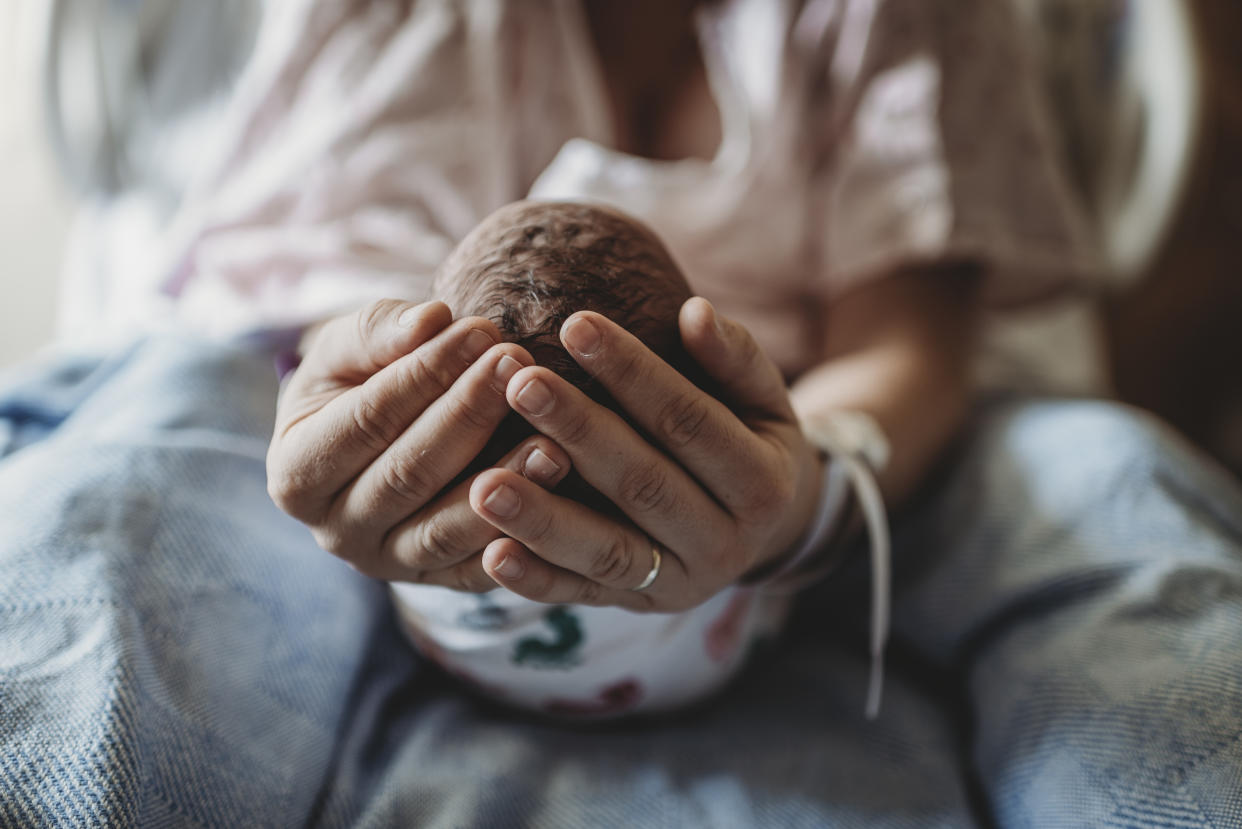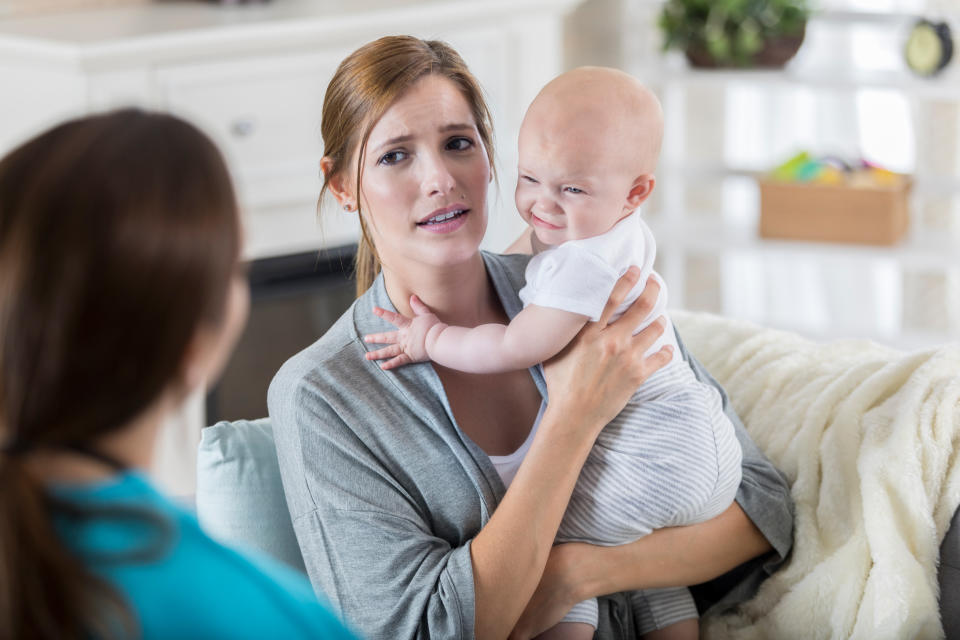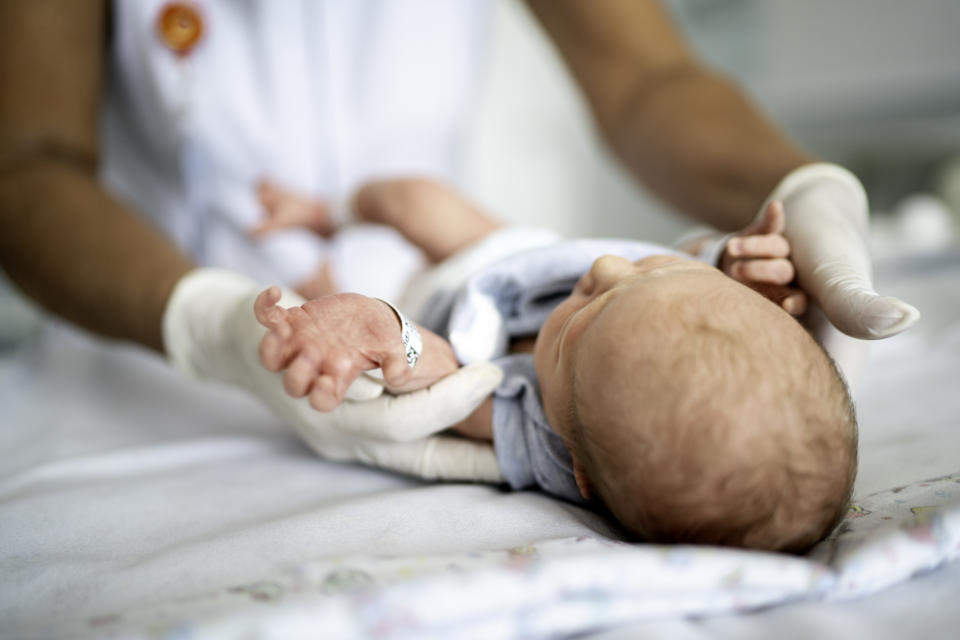Health visitors raise concerns about vulnerable new parents amid coronavirus restrictions

Many health visitors are considering leaving their roles because of the pressure COVID-19 restrictions have placed on their careers, a report from University College London has found.
Added to which, most (96%) are concerned about the plight of vulnerable families, especially women and children at risk of domestic violence and abuse.
Dr Cheryll Adams, executive director of the Institute of Health Visitors, said it “keeps them up at night”.
Read more: Millie Mackintosh reveals daughter has silent reflux
People may assume that local lockdowns are playing a role in whether or not the health visitor has the ability to do their job, but Dr Adams explains that’s not necessarily the case.
“It’s all down to local decision making,” she says. “Blackpool managed to keep services up and running the whole way through lockdown.
“Some areas have found it too difficult so just haven’t tried and others have seen it as a challenge.”

While some health visitors are wearing PPE to continue home visits, others are conducting their checks over the phone or via Zoom calls.
This has led to an increase in concern about vulnerable women, as it’s easy for simple cues to be missed over Zoom.
“Things can be missed via Zoom - you can’t sense if there’s a dad being difficult in the house,” explains Dr Adams.
Read more: Kate Ferdinand opens up about back pain in pregnancy
Dr Adams also raised concerns over the fact that more families in the UK are being plunged into poverty and becoming vulnerable as a result of the pandemic, which could mean they miss out on health visitor appointments.
“It’s assumed that everybody has access to telephone credit and internet and that’s not the case,” she adds.
It’s not just vulnerable new parents feeling the impact of limited health visiting services, either.
Women have shared stories of going into birth alone and have reported how their children have changed during lockdown in heart-wrenching accounts.
Watch: These celebrity parents look eerily like their children
Rosie Little, 33, from Brighton, had her first child six weeks before lockdown.
While she was able to have one check-in with her health visitor after her baby was born, she has had no further checks or support since then.
“We got a call at the start of lockdown to say our health visitor had been seconded to the front line and we wouldn’t have a replacement. All we got was a leaflet about weaning in the post but it had been photocopied so many times it was unreadable,” Little explains.
Due to the restrictions, drop-in clinics were closed, leaving Little with no indication of whether her son’s weight or development was on track.
“The main thing I’ve missed is being able to get advice and support on things like his weight, breastfeeding, reflux, rashes - the kind of stuff you don’t want to bother a GP with, especially as it’s been so difficult getting hold of a GP too.
“These checks are clearly important enough that they’re thought to be necessary in normal times, so I can’t help but feel my son is missing out and if anything is wrong it might not be spotted until it’s too late.
“You do feel a bit abandoned. It’s hard enough as a first-time mum without the support network being taken away,” she added.
Health visiting “should be reinstated”
Almost 40% of health visitors saw the number of children they were responsible for go up between 19 March to 3 June.
“We went into COVID-19 with not enough troops on the ground,” Dr Adams explains.
The profession suffered 30% government cutbacks over the five years leading up to the coronavirus pandemic, meaning they were underprepared for the impact.

This, coupled with the risk of contracting the coronavirus, meant health visitors were unable to visit people’s homes. Others were re-deployed to other areas of the NHS, leaving an already struggling profession “depleted” according to Dr Adams.
The report found that “health visiting services should be reinstated (where not happened already) as a matter of urgency as a vital support and safety-net for children, with appropriate measures put in place, including the use of PPE, to reduce the spread of the virus.”
Read more: Mums are loving Ashley Graham’s postpartum stretch marks
Help is available
It’s not clear if and when this UK-wide reinstatement will happen. At the moment, it’s a recommendation, but Dr Brooke Vandermolen, Obstetrics & Gynaecology doctor and co-founder of The Birth Collective online antenatal classes, says that high-risk women should be being seen as a priority.
“Women at higher risk (known psycho-social vulnerabilities, those who had an operative birth, premature/low birthweight baby or other medical or neonatal complexities) should be prioritised for face-to-face follow ups,” Dr Vandermolen explains.
“If you have had a traumatic birth experience you can ask for a debrief appointment before leaving hospital, or if you didn’t know at the time then ask your GP, midwife or health visitor to refer you. This can be really helpful in processing the experience of a traumatic birth and even prevent longer term complications like postnatal depression.”
She says that it “shouldn’t be necessary” for women to reach out to health visitors and that they should hear from one, particularly as the “RCOG (Royal College of Obstetricians and Gynaecologists) advises that the first postnatal check at home after discharge should ideally be face-to-face and this is usually with a community midwife”.
If for any reason, women haven’t received a call from their health visitor or midwife, Dr Vandermolen recommends: “Ring your postnatal ward, community midwife, health visitor or GP for support. Most services are still running, but they may be running in a different way to previously. This website gives helpful advice around health visitors and the pandemic.”
Read more: Baby born at 25 weeks is finally strong enough to go home
Midwife, author of The Modern Midwife and creator of the Pregnancy, Birth and Beyond series, Marie Louise, concurs with Dr Vandermolen’s statement, saying “Help and support pregnancy wise there is actually a lot still running.
“Firstly maternity services are still very much offering their support and the first line for women to seek any support from during pregnancy and 28 days following birth. There are midwives and doctors that specialise in perinatal mental health,” she explains.
On occasions where women feel that they’re not sure where to turn during the pandemic, Marie Louise recommends two useful resources.
The first is the charity Tommy’s which the midwife finds particularly useful because it “has a wellbeing tool for women to access for free”.
Similarly, she often refers women to the Maternal Mental Health Alliance, which supports women and children in all situations.
“It is important to remember that help is absolutely available,” Dr Vandermolen concludes.




